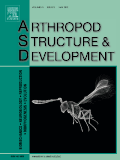
ARTHROPOD STRUCTURE & DEVELOPMENT
Scope & Guideline
Fostering Collaboration in Insect Research
Introduction
Aims and Scopes
- Morphological and Anatomical Studies:
The journal prioritizes research that investigates the morphology and anatomy of various arthropods, including their external and internal structures, sensory organs, reproductive systems, and developmental stages. - Functional Morphology:
Papers often delve into the functional aspects of morphology, exploring how structural features relate to the ecological roles and behavioral functions of arthropods. - Comparative Analyses:
The journal encourages comparative studies that highlight evolutionary relationships among arthropod taxa, facilitating a better understanding of morphological adaptations across different environments. - Ultrastructural Investigations:
Research focusing on ultrastructural aspects using advanced imaging techniques is a significant component, providing detailed insights into the microscopic features of arthropods. - Developmental Biology:
The journal includes studies that examine developmental processes in arthropods, shedding light on ontogeny and the evolution of morphological traits.
Trending and Emerging
- Integrative Morphological Approaches:
There is a growing trend towards integrative studies that combine morphology with molecular techniques, providing a holistic view of arthropod structure and function. - Microstructural and Ultrastructural Research:
Recent papers increasingly focus on the ultrastructure of tissues and organs, utilizing advanced imaging techniques such as electron microscopy to reveal new insights into arthropod anatomy. - Evolutionary Developmental Biology (Evo-Devo):
The intersection of evolutionary biology and developmental studies is becoming more prominent, with research exploring how developmental processes influence morphological evolution in arthropods. - Sensory Biology:
Studies examining the morphology and function of sensory organs, particularly in relation to ecological adaptations, are on the rise, highlighting the importance of sensory mechanisms in arthropod survival and behavior. - Genomic and Genetic Investigations:
Research incorporating genomic data to understand morphological traits and evolutionary relationships is increasingly common, reflecting a broader trend in biology towards the integration of genetic information.
Declining or Waning
- Behavioral Morphology:
Research directly linking morphology to specific behaviors has become less frequent, suggesting a shift towards more structural and genetic studies rather than those that combine morphology with behavioral ecology. - Paleontological Morphological Studies:
Although studies on fossil arthropods have been integral to understanding evolutionary history, recent publications indicate a waning focus on paleontological aspects, possibly due to the increasing interest in molecular and developmental biology. - General Taxonomic Descriptions:
There is a noticeable decline in papers solely focused on taxonomic descriptions without accompanying morphological or functional analysis, reflecting a trend towards more integrative approaches to taxonomy.
Similar Journals

Journal of Comparative Physiology B-Biochemical Systems and Environmental Physiology
Championing Cutting-edge Research in Comparative PhysiologyJournal of Comparative Physiology B-Biochemical Systems and Environmental Physiology, published by SPRINGER HEIDELBERG in Germany, stands at the forefront of research in the fields of physiology, biochemistry, and ecological systems. With a commitment to fostering interdisciplinary communication, this journal has been a vital resource since its inception in 1974, converging scientific exploration through the lens of biochemical mechanisms and environmental adaptations in animal systems. Renowned for its rigorous peer-review process, it has achieved impressive rankings, including Q2 in Animal Science and Zoology and Ecology, Evolution, Behavior and Systematics, reflecting its substantial impact within these disciplines. The journal aims to disseminate cutting-edge research that advances our understanding of physiological and biochemical processes while addressing contemporary environmental challenges. While currently operating on a traditional access model, the journal's contributions are crucial for researchers, professionals, and students seeking profound insights into the complex interactions between organisms and their environments.

Arthropod Systematics & Phylogeny
Advancing arthropod knowledge through systematics and phylogeny.Arthropod Systematics & Phylogeny is a pivotal journal published by the SENCKENBERG NATURHISTORISCHE SAMMLUNGEN DRESDEN, MUSEUM TIERKUNDE in Germany, dedicated to advancing the understanding of arthropod systematics, phylogenetics, and evolutionary biology. With an ISSN of 1863-7221 and an E-ISSN of 1864-8312, this journal has established itself as a reputable source for high-quality research, evident by its ranking in the Q1 category for Insect Science and Q2 in Genetics. Covering a spectrum of subjects within the realms of agricultural and biological sciences, it caters to a diverse audience of researchers, professionals, and students eager to explore the intricate relationships and evolutionary histories of diverse arthropod taxa. The journal has been consistently publishing impactful studies since its inception in 2009, with ongoing contributions expected to bolster its presence in the academic community through 2024 and beyond. Although it currently does not offer open access options, its rich content serves as a valuable resource for those passionate about entomology and genetics, fostering collaboration and innovation in an important area of biological research.

JOURNAL OF MAMMALIAN EVOLUTION
Innovating Understanding in Mammalian Ecology and BehaviorJOURNAL OF MAMMALIAN EVOLUTION, published by SPRINGER, stands at the forefront of the field of mammalian evolutionary research since its inception in 1993. Renowned for its scholarly rigor, this journal covers an extensive range of topics within ecology, evolution, behavior, and systematics, achieving a prestigious Q1 rank in its category, according to the latest metrics. With an ISSN of 1064-7554 and E-ISSN of 1573-7055, it offers critical insights into the diverse adaptations and evolutionary processes of mammals, making it an invaluable resource for researchers, professionals, and students alike. The journal maintains a significant impact factor, reflecting its relevance in shaping current discourse and discoveries within the biological sciences, particularly in mammalogy. Access to its rich repository of articles aids in fostering scientific collaborations and advancing knowledge in the evolutionary sciences, thus solidifying its role as a critical platform for cutting-edge research.
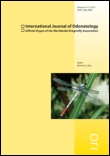
INTERNATIONAL JOURNAL OF ODONATOLOGY
Bridging Ecology and Evolution through Odonate StudiesINTERNATIONAL JOURNAL OF ODONATOLOGY, published by Wachholtz Verlag GmbH, is a vital resource for researchers and professionals in the fields of Ecology, Evolution, Behavior, and Insect Science. Established in 1998, this journal provides a platform for the dissemination of innovative research pertaining to odonatology, encompassing the ecological and biological interactions of dragonflies and damselflies. With its focus on advancing knowledge within these scientific disciplines, the journal holds a commendable Q3 ranking in Ecology, Evolution, Behavior and Systematics and a Q2 ranking in Insect Science for 2023, reflecting its significance in academic circles. Although it operates without open access, its articles are accessible through institutional subscriptions, allowing for wide dissemination among scholars and practitioners. The journal's commitment to publishing high-quality, peer-reviewed research makes it an authoritative source of information that enriches the study of odonates and their broader ecological contexts. For inquiries, the journal's editorial team can be reached at C/O Fleet7, Fleethorn 7, Kiel 24103, Germany.
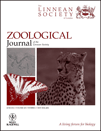
ZOOLOGICAL JOURNAL OF THE LINNEAN SOCIETY
Fostering a deeper understanding of our animal kingdom.Zoological Journal of the Linnean Society, published by Oxford University Press, stands as a prestigious vessel for scholarly discourse in the fields of Animal Science and Ecology. With an ISSN of 0024-4082 and E-ISSN 1096-3642, this journal has an illustrious history dating back to its inception in 1866, and has consistently contributed groundbreaking research that shapes our understanding of zoology and evolutionary biology. Operating out of the United Kingdom, the journal boasts an impressive Q1 ranking in both Animal Science and Zoology and Ecology, Evolution, Behavior and Systematics, positioning it among the top tier of its category. With a significant presence in the academic landscape, the journal ranks 24th among 490 in Animal Science and 97th among 721 in Ecology, reflecting its impact and relevance in the field. Although it is not an open access journal, the wealth of knowledge it offers is invaluable for researchers, professionals, and students alike, aiding in the advancement of zoological sciences.
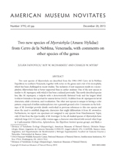
AMERICAN MUSEUM NOVITATES
Elevating Understanding: Insights from the American Museum of Natural History.AMERICAN MUSEUM NOVITATES, published by the American Museum of Natural History, stands as a prestigious platform for scholarly dissemination in the fields of Archeology, History, and Museology. With an impressive impact factor evidenced by its Q1 rankings in 2023 across these categories, this journal is a vital resource for researchers and professionals seeking to advance knowledge and understanding within these disciplines. The journal's commitment to quality research is reflected in its high rankings within Scopus, where it boasts a remarkable rank of #37 in History and #4 in Museology, showcasing its relevance and influence in the academic community. While open access options are not currently available, readers can access compelling research articles that span from its inception in 2005 to the present date, making it an essential reference for those interested in the historical and cultural implications of natural history and museum studies. Located in the heart of New York, this journal fosters a collaboration between scientists and scholars, enriching both academic and public understanding of our shared heritage.

INTERNATIONAL JOURNAL OF MORPHOLOGY
Pioneering Discoveries in Organismal StructureThe INTERNATIONAL JOURNAL OF MORPHOLOGY is a distinguished publication dedicated to the field of anatomy, significantly contributing to the scholarly discourse within this essential area of medical science. Published by the SOC CHILENA ANATOMIA and located in Chile, this journal aims to disseminate groundbreaking research that explores the structural aspects of organisms, from comparative anatomy to developmental processes. With an H-index reflecting its growing impact, the journal has achieved a Q3 ranking in the category of Anatomy according to the 2023 metrics, positioning it among the competitive resources available to the scientific community. Researchers and professionals engaging with this journal can expect to encounter rigorous studies, insightful reviews, and innovative methodologies. Though not strictly open access, the journal remains pivotal for those keen on advancing their understanding of morphological structures and their implications in various fields. With convergence ongoing from 2006 to 2024, the INTERNATIONAL JOURNAL OF MORPHOLOGY is poised to further solidify its role as a vital source of knowledge for anatomy enthusiasts and experts alike.
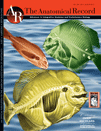
Anatomical Record-Advances in Integrative Anatomy and Evolutionary Biology
Illuminating the Path of Integrative Anatomical Research.Anatomical Record-Advances in Integrative Anatomy and Evolutionary Biology, an esteemed journal published by WILEY, serves as a pivotal platform for scholars in the fields of anatomy, biotechnology, ecology, evolutionary biology, and histology. With an ISSN of 1932-8486 and an E-ISSN of 1932-8494, this journal has demonstrated its academic rigor by maintaining a Q2 ranking across multiple relevant categories, including Anatomy and Biotechnology, and consistently achieving a high Scopus ranking in its respective fields. Its scope, covering integrative approaches to anatomical research and evolutionary studies, fosters interdisciplinary collaboration and innovation. Researchers and practitioners can access the journal through various open-access options, ensuring that groundbreaking findings are disseminated widely. As a vital resource for advancing knowledge and exploring emerging trends, this journal greatly contributes to the understanding of biological systems and evolutionary processes, making it an essential read for those dedicated to pushing the boundaries of their respective disciplines.

ZOOMORPHOLOGY
Advancing the frontiers of animal morphology.ZOOMORPHOLOGY, published by SPRINGER, stands as a pivotal journal in the fields of Animal Science, Zoology, and Developmental Biology. Since its inception in 1980, this journal has been dedicated to advancing the understanding of animal morphology and the evolutionary adaptations of various species. With an ISSN of 0720-213X and an E-ISSN of 1432-234X, ZOOMORPHOLOGY boasts a Q2 ranking in Animal Science and Zoology and is recognized within the Q4 category in Developmental Biology as of 2023, reflecting its impactful contributions to the scientific community. The journal is indexed in Scopus, where it ranks #224 out of 490 in Animal Science and Zoology, and #66 out of 82 in Developmental Biology, positioning it as a resource of considerable significance for researchers and professionals in these disciplines. Although ZOOMORPHOLOGY currently operates on a traditional access model, it continues to foster scholarly communication and inspire future researchers through rigorous peer-reviewed articles that explore the intricate relationships between form and function in the animal kingdom. With a commitment to excellence and innovation, ZOOMORPHOLOGY remains a vital platform for publishing high-quality research that drives forward our knowledge in morphology and evolutionary biology.

EVOLUTION & DEVELOPMENT
Pioneering Research that Connects the Dots of Biological Complexity.EVOLUTION & DEVELOPMENT is a prestigious academic journal published by WILEY, focusing on the intricate interplay between evolutionary and developmental processes. With an ISSN of 1520-541X and an E-ISSN of 1525-142X, this journal has established itself as a leading source of scholarly articles since its inception in 1999. It enjoys a Q2 ranking in Developmental Biology and a remarkable Q1 ranking in Ecology, Evolution, Behavior and Systematics, positioning it among the top-tier journals in these fields, as evidenced by its Scopus rankings, notably the 26th percentile in Developmental Biology. Researchers and practitioners benefit from high-quality peer-reviewed articles that push the boundaries of knowledge and foster interdisciplinary collaboration. While open access options are not currently available, the journal's robust visibility and impact factor underscore its importance in advancing understanding within the biological sciences. The editorial objective of EVOLUTION & DEVELOPMENT is to bridge the gap between evolution and development, integrating findings that elucidate the paths of organismal change. The journal is a must-read for anyone dedicated to exploring the complexities of life sciences, making it an invaluable resource for researchers, professionals, and students alike.